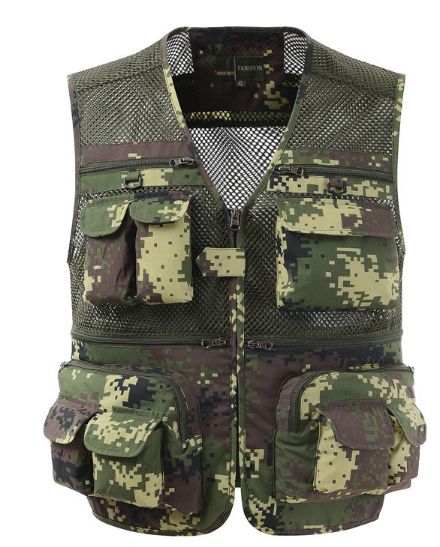Tool vest is a type of workwear designed to help workers carry and organize tools while on the job. It typically consists of a vest with multiple pockets and loops that can hold various types of tools, such as hammers, screwdrivers, pliers, and wrenches.
Tool vests are popular among professionals in a variety of fields, including construction, carpentry, electrical work, and plumbing. They allow workers to keep their tools close at hand and easily accessible, which can help increase efficiency and productivity on the job.
Tool vests come in different styles and designs, with some featuring adjustable straps for a custom fit, breathable materials to keep workers cool, and reflective accents for increased visibility in low-light conditions. Some tool vests even have built-in hydration systems to keep workers hydrated throughout the day.
Overall, a tool vest can be a useful and practical addition to any worker's toolkit, helping to improve organization, efficiency, and comfort on the job.
Tool Vest,Tool Vest Electrician,Lightweight Tool Vest,Utility Tool Vest ZHANGJIAGANG CITY XIANGLE TOOL CO., LTD. , https://www.xiangletoolbag.com
Tile market problems and more "three camps" show their magic
The article discusses the current challenges facing the ceramic tile industry, particularly in China. Recent sales of ceramic products have dropped significantly, leading to a large accumulation of tiles in manufacturers' warehouses. Industry sources indicate that inventory levels, which previously accounted for about one-third of production, have now risen to over half in many companies. According to an official from the Foshan Taoli Office of the China Tao Association, more than half of Foshan's ceramic companies have shut down their kilns early due to rising stockpiles, with approximately 15% of enterprises completely halting production.
This downturn is partly attributed to weak demand from the real estate sector, which has been struggling for some time. In addition, declining product quality has further contributed to reduced sales. Some large ceramic companies have even stopped firing their kilns entirely, with several firms producing over 2 billion yuan annually ceasing operations. A recent spot check by the AQSIQ revealed that out of 138 types of ceramic tiles from 135 companies across 11 provinces and municipalities, 121 passed the test, giving an overall pass rate of 87.7%. This highlights ongoing concerns about product quality.
For ceramic companies, improving product quality is not just important—it's essential. Only through consistent quality can businesses build trust and drive sales. As a result, companies are focusing on both product excellence and efficient distribution channels. Industry insiders note that past crises were often linked to unstable quality, which directly impacted sales. During a visit to some dealers, reporters found that distributors place a high priority on product quality, reflecting the importance of maintaining standards throughout the supply chain.
Dealers play a crucial role in ceramic sales, and they share the same emphasis on quality as manufacturers do. Industry experts believe that building a strong brand requires a focus on both product quality and after-sales service. Creating a reputable brand means continuously improving and maintaining product standards.
In response to these issues, the Quality Supervision Department has intensified its efforts to ensure compliance. On March 14, law enforcement officers from the Sifang Sub-branch conducted a special inspection at a materials market in Changsha Road. One store was found lacking a valid 3C certificate, and staff initially provided an incorrect inspection report before refusing to produce the required documents. The business was later penalized for selling unlicensed products and ordered to submit to further investigation within three days.
According to officials, selling unlicensed products could result in fines ranging from 50,000 to 200,000 yuan. This strict enforcement stems from the fact that some ceramic tiles may emit harmful radiation, making 3C certification mandatory. The 3C certification system, short for China Compulsory Product Certification, is designed to protect consumer safety and ensure product quality. It applies to certain types of ceramic tiles, especially those with potential radioactivity, such as polished and antique tiles. Glazed wall tiles, however, are not subject to this requirement.
In Nanjing’s tile market, prices for low- and mid-range domestic ceramics have slightly decreased compared to last year, with prices per square meter ranging between 40 and 120 yuan. Meanwhile, imported and high-end domestic brands continue to rise in price, often exceeding 180 yuan per square meter. Despite this, the market remains diverse, with different consumer segments favoring various types of tiles.
The "three camps" of ceramic products each have their own distinct appeal:
1. **Imported Tiles**: Represented by Italian and Spanish brands, these tiles enter the market with a premium image, excelling in quality and design. Their glaze process ensures long-lasting color and natural transitions, offering an elegant finish. Brands like Meisheng Yasuoli and Bees are popular among high-end buyers.
2. **Joint Venture Tiles**: These are produced through partnerships between mainland and Taiwanese manufacturers. While their designs are slightly less advanced than imported options, they offer competitive pricing. Brands like Sheraton, Rome, and Champions are gaining traction, with prices varying depending on size and type.
3. **Domestic Large Brands**: Known for cost-effectiveness and quality, these brands meet or exceed international standards. For example, China’s national standards for ceramic tiles are higher than European ones, particularly in terms of surface smoothness, edge straightness, and wear resistance. Domestic polished tiles are already at an international level and have a significant presence in exports.
Overall, the environmental performance of tiles sold in Nanjing’s major markets is considered reliable. The introduction of 3C certification has given consumers a clear standard to assess product safety. Several brands visited by the reporter were able to provide 3C certificates and radiation test reports, with all passing 100%. This bodes well for the future of the industry, as quality and compliance become increasingly important.